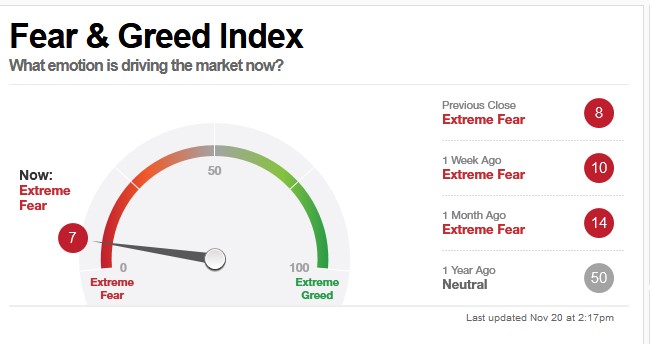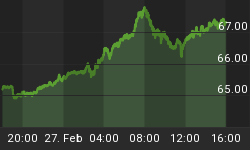It’s about two weeks since Democrats romped to a historic victory after retaking the House of Representatives in the midterm elections. The elections were marked by several milestones, including the biggest voter turnout of any midterm election as well as the biggest margin in a midterm blowout in 40 years.
The markets seem to have been rattled by the turn of events. Volatility has spiked; fear in the markets has become palpable and markets are in selloff mode once again.

(Click to enlarge)

(Click to enlarge)
Source: CNN Money
Wealthy investors, however, remain mostly unmoved amidst all the turbulence. According to a survey by online stock brokerage, E-Trade, 67 percent of investors with $1 million or more in their brokerage accounts do not plan to sit tight and not make any major changes to their portfolios, despite nearly half expecting an increase in market volatility.
An interesting takeaway from that survey is that the majority of these millionaires are less sanguine about the economic prospects under the new order of things. Overall, 38 percent of Republicans and 33 percent of Democrats are more bullish towards the market under the new dispensation than they were before the elections. Related: Stock Sell-Off Accelerates As Bear Market Looms
Here are some of other key findings:
• Only 22 percent of big investors believe that the new Congress will bring inflation under control
• 16 percent think the new Congress will positively impact investment taxes
• Just a mere 13 percent think Congress will be able to lower taxes they pay on personal debts such as mortgages
• 18 percent believe that the new Congress will positively impact the prices they pay for goods
In the final analysis, however, this is less of an indictment on the precise makeup of Congress than it is a recognition of the fact that we are living in an environment of rising rates. The ongoing market selloff might have less to do with the reshuffling of House seats and more to do with the overhang of the unresolved trade war with China.
Mike Loewengart, CIO at E-Trade Capital Management, says there’s another less obvious reason for the general pessimism—ballooning federal deficit.
According to him, there is a general feeling of helplessness that we cannot tame the widening budget deficit, which will inevitably lead to a spiral effect of higher interest rates and cost of borrowing for the average investor. As a result, nearly 30 percent believe that the bull market will end in a year or two while only eight percent believe it will continue to run for five or more years.
Betting on Healthcare
The survey was not all doom and gloom though, with significant numbers of respondents giving thumbs up to a few sectors of the economy. Notably, 58 percent of wealthy investors believe the health sector still has some legs to run while 44 percent are betting on the financial sector.
Related: SEC Crackdown On ICOs Leads To New Lawsuits
The endorsement of healthcare should probably not come as surprise given the fact that Democrats have already played a big role in defending Obamacare, and also due to the tendency of the sector being a late bloomer in the economic cycle.

(Click to enlarge)
Finally, former Starbucks CEO Howard Schultz might want to reconsider his ambition to run for president during the next general elections. Schultz fared even worse than the Rock and Oprah in the survey, though of course he might simply point out that opinion polls have not been 100 percent foolproof in the past.

(Click to enlarge)
Source: CNBC
By Alex Kimani for Safehaven.com
More Top Reads From Safehaven.com:
















